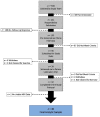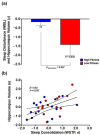Cardiorespiratory Fitness as a Moderator of Sleep-Related Associations with Hippocampal Volume and Cognition
- PMID: 36291294
- PMCID: PMC9599432
- DOI: 10.3390/brainsci12101360
Cardiorespiratory Fitness as a Moderator of Sleep-Related Associations with Hippocampal Volume and Cognition
Abstract
The objective of this study was to understand the associations of sleep and cardiorespiratory fitness with hippocampal volume and global cognition among older adults (n = 30, age = 65.8 years, female = 73.3%). Wrist actigraphy provided objective measures of nighttime sleep including sleep duration, average wake bout length (WBL; sleep disturbance), and wake-to-sleep transition probability (WTSP; sleep consolidation). Cardiorespiratory fitness was quantified via cycle exercise using a modified heart rate recovery approach. Magnetic resonance imaging was used to determine hippocampal volume and the Mini-Mental State Examination was used to assess global cognition. Fitness moderated associations of sleep with hippocampal volume and cognitive performance, whereby the association of WBL-an index of poor sleep-with hippocampal atrophy was stronger among less-fit individuals, and the association of sleep duration with cognitive performance was stronger among more-fit individuals. Across the fitness levels, a longer WBL was associated with lower cognitive performance, and a higher WTSP-an index of more consolidated sleep-was associated with greater hippocampal volume. Sleep and fitness were unrelated to the volume of an amygdala control region, suggesting a degree of neuroanatomical specificity. In conclusion, higher cardiorespiratory fitness may attenuate sleep disturbance-related hippocampal atrophy and magnify the cognitive benefits of good sleep. Prospective studies are needed to confirm these findings.
Keywords: actigraphy; aging; brain volume; heart rate recovery; sleep.
Conflict of interest statement
A.J.A. contributed to this article as a graduate student at the University of Maryland and as an employee of the Johns Hopkins University. The views expressed are his own and do not necessarily represent the views of the NIH or United States Government. L.R.W. is a consultant to Booze Allen. A.P.S. received payment for serving as a consultant for Merck and received honoraria from Springer Nature Switzerland AG for Guest Editing Special Issues of
Figures




Similar articles
-
Cardiorespiratory Fitness May Protect Memory for Poorer Sleepers.Front Psychol. 2022 Feb 17;13:793875. doi: 10.3389/fpsyg.2022.793875. eCollection 2022. Front Psychol. 2022. PMID: 35250729 Free PMC article.
-
Low body mass and high-quality sleep maximize the ability of aerobic fitness to promote improved cognitive function in older African Americans.Ethn Health. 2022 May;27(4):909-928. doi: 10.1080/13557858.2020.1821176. Epub 2020 Sep 15. Ethn Health. 2022. PMID: 32931310 Free PMC article.
-
Neurotrophic factors and brain health in children with overweight and obesity: The role of cardiorespiratory fitness.Eur J Sport Sci. 2023 Apr;23(4):637-648. doi: 10.1080/17461391.2022.2044912. Epub 2022 Mar 6. Eur J Sport Sci. 2023. PMID: 35179432
-
Hippocampal substructural vulnerability to sleep disturbance and cognitive impairment in patients with chronic primary insomnia: magnetic resonance imaging morphometry.Sleep. 2014 Jul 1;37(7):1189-98. doi: 10.5665/sleep.3836. Sleep. 2014. PMID: 25061247 Free PMC article.
-
Low-intensity daily walking activity is associated with hippocampal volume in older adults.Hippocampus. 2015 May;25(5):605-15. doi: 10.1002/hipo.22397. Epub 2014 Dec 26. Hippocampus. 2015. PMID: 25483019 Free PMC article. Clinical Trial.
References
-
- Siddarth P., Thana-Udom K., Ojha R., Merrill D., Dzierzewski J.M., Miller K., Small G.W., Ercoli L. Sleep quality, neurocognitive performance, and memory self-appraisal in middle-aged and older adults with memory complaints. Int. Psychogeriatr. 2021;33:703–713. doi: 10.1017/S1041610220003324. - DOI - PMC - PubMed
Grants and funding
LinkOut - more resources
Full Text Sources

